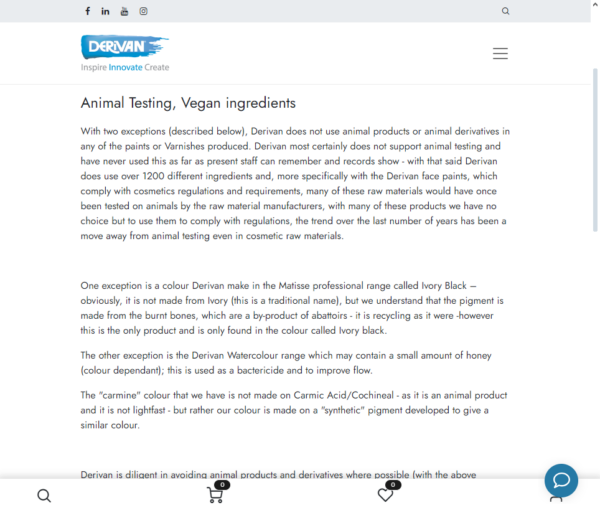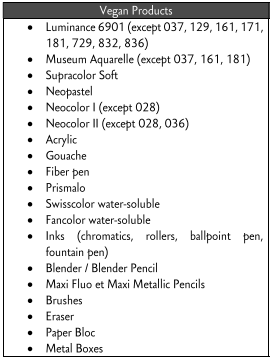Thank you to my reader M, for letting me know that Derivan have their cruelty-free statement now up on their website.
Here you can find Derivan’s statement.

Source: reader mail; Derivan website
Derivan’s listing in my compendium.
cruelty free
Thank you to my reader M, for letting me know that Derivan have their cruelty-free statement now up on their website.
Here you can find Derivan’s statement.

Source: reader mail; Derivan website
Derivan’s listing in my compendium.
I am very glad to be the messenger of such good news.
Caran d’Ache sent me their certificate of compliance .
I contacted them for products free of animal derivatives – including manufacturing process- and for their cruelty-free status. And good tidings I bring.
Please see the Caran D’Ache certificate of compliance and pay attention to exceptions in product lines. Some products contain the pigment ivory black, which is of an animal source.
Neither products nor raw materials get tested on animals.
Product lines free of animal derivatives (with exceptions of products containing the pigment ivory black):

Source: mail contact
Cruelty-free has a broader spectrum of meaning. Just like the word “vegan” it is not set in stone and has no universally accepted set terminology. Is is open to interpretation.
In its foremost use, in all things “vegan” and animal related, it applies to being “free of animal testing”.
You can find my other latest article about this topic over here. And below you find a short overview.
On product packaging you will find this word, for example. Which means, a company makes the claim that the product is free of animal testing. If a company makes no further statements, this term should only be applied to this finished product, not its manufacturing process, not a whole product range of a company nor the company’s overall stance on animal-testing.
cruelty-free labelling and levels concerning animal testing:
This is how it is mainly viewed and used, but it is not the only interpretation. A reader recently pointed out to me that Faber-Castell produced a meat signing pen and could therefore not be seen as cruelty-free. You find my brief post about this over here.
Although this pen might have been free of animal derivatives (speculation for this explanation, I do not have any detailed information other than Faber-Castell stating this year that most of its products are free of animal derivatives), and the company might be free of animal testing, the pen’s intended use was connected to animal suffering.
Can a company be even free of any kind of cruelty in a broader sense that means more than ” animal testing”?
Most art and writing material suppliers do offer a range of products and not only products that are free of materials of an animal source.
Products containing
None of these things are cruelty-free in a broader sens; at this point, only concerning animals.
It would be a rare thing to find a brush company solely dedicated to producing brushes that are vegan; meaning their entire product range being free of animal derivatives.
Unless a company only sells all the way vegan products and has a defined on all level applying cruelty-free (animal sense) ethic, there will have been animal suffering.
Now the question is how many there actually are out there free of any kind of suffering attached to raw materials.
Another point or part of this is, companies having different tiers of product “quality”, if you will. They have e.g. crafting and school supplies, art supplies of different levels (beginner, hobby, student, artist /professional) and their fancy high-end tier. Offering e.g. leather bound fountain pens and leather bound sketch- and notebooks. Leather rolls for your coloured pencils, … . Undeniably, there has been animal suffering involved. Even, if claimed, the hides, bone ash etc. being leftovers from the meat industry.
Unfortunately, we do not live in an utopian world, void of animal suffering and cruelty against them. Mankind cannot even keep from it, concerning each other. How can we even expect them to muster up some form of acknowledgement and concerns for other beings and mother earth itself.
Which leads me to”cruelty-free”‘s , the meaning concerning humans.
Generally, we can think of
Although all the points above are important, child labour is standing out.
You will certainly stumble over child labour, if “Mica” is involved. Back some years ago, I mentioned Refinery 29’s short documentary about it and I also wrote a post about a company here, using “ethically” sourced Mica, their supplier being part of the “Responsible Mica Initiative”, working against child labour.
In the last week I happened upon a documentary on the channel 3SAT about said topic and initiative in India. The chairwoman informed the reporter that it does not mean, villages, areas, mines involved, are guaranteed free of child labour. It means they are working towards it, but it is not a guarantee, you won’t find a child at a mine, even if the initivative is working with people in the villages surrounding the mine.
The chairwoman also mentioned, natural Mica should not be avoided because it would take the lifelihoods of entire regions in India and Madagascar.
Some companies have changed to using synthetic Mica, e.g. Lush.
It still comes as a shock though, that the initiative does not come as a guarantee of no child labour .
Suprising is Mica’s different kind of use. Computer /phone companies, e.g. Samsung using Mica; drill holes being filled with it, some companies put it in toothpaste for optics and the list goes on. You only can ask why? How are we supposed to know, and what reasoning is happening, that companies are stuffing Mica into all those products? If it is not mentioned e.g. on a packaging for make-up or toothpaste, we won’t even be aware of it. A reason given for toothpaste being for optics? I don’t want to find titaniumdioxide in anything else but my art supplies; we art realm inhabitants have been aware of its carcinogen properties, because product packaging and information literally warns of it. I don’t want it in toothpaste and I certainly don’t want Mica in it. Who needs shimmery toothpaste? No one.
What company can be free of any form of cruelty, it can assume?
We can only keep on learning; and we can only keep on doing the best we can, acknowledging and adapting to new information we stumble upon.
The documentary I mentioned was aired on 3Sat on September 15th, 2023, when I was able to watch part of it. The reporter is Anne-Sophie Galli and the German name of the documentary was ” Glitzermineral Mica – Kinderarbeit für unsere Autos, Handys und Kosmetik” , translated : ” Shimmer material Mica – child labour for our cars, cellphones and cosmetics/ make up”. It was previously aired earlier this year here on youtube. There are unfortunately only German subtitles available at the moment.
For more information about animal based raw material, see my information sheet (German Version).
Copic Marker
Manufacturer: Too Marker Products Inc.
All Copic products are vegan / free of animal products; in all its components , also including the manufacturing process not just the finished products.
Cruelty-free level: Too Marker Products does not conduct nor commission animal testing from other parties.
Too will get back to me about Material Safety Data Sheets – provided by raw material suppliers, about whether there has been such testing within the last 20-30 years.
They grade their Copic products as completely free of animal-testing.
Source: Mail Contact
Yesterday, I received an update from Faber-Castell. They sent me two statements to publish here: the English Version and a German Version for you to read. According to those, the vast majority of products is free of animal derivatives.
They are still a cruelty-free company on all levels. They do not test on animals nor commission it by other parties.
I did reach out to them again today, to double check once more that all of the products previously listed in my February 2022 update are still free of animal derivatives and I also asked about the Fude Pens, which I forgot to ask about in December.
my Faber-Castell entry in the Compendium
Faber-Castell Vegan Statement 2022
Faber-Castell Vegan Bescheinigung 2022
Source: Mail contact
Following new Faber-Castell products are free of animal derivatives – including the manufacturing process:
The material used for all brush hair is nylon.
Faber-Castell is a cruelty-free company on all levels; they do not test on animals, neither commission other parties to do so; the raw material chain is free of animal testing
They would like you to know, that animal testing for art-, writing- and drawing materials/ supplies is banned in Europe.
No animal based raw materials are ever used as auxiliary supplies/ additives in Faber-Castell’s entire production.
source: mail contact
Moleskine would like you to know that at this moment in time, during the paper binding process, traces of gelatin may be present.
Moleskine is working to find new sollutions concerning this topic.
Moleskine’s cruelty-free status: they do not test on animals and neither commission it from other parties
source: mail contact
Hi there,
here is the updated Gelli Arts information about their Gelli Plates:
Gelli Arts confirmed that the Gelli Plates are still vegan-friendly and are still cruelty-free, staying the same as four years ago.
Four years ago, the statement was that Gelli Arts is cruelty-free, they don’t test on animals and don’t commission any other parties to do so. Materials used in the Gelli Plates are free of animal testing. Gelli plates are free of animal derivatives.
Source: mail contact
Here is my information sheet, I send out to all companies.
Here is my 2021 updated information sheet with guidelines for a cruelty-free company and vegan-friendly and vegetarian-friendly products, which I send out to companies.
At your disposal:
English Version (PDF)
German Version (PDF)
I have resumed sending out enquiries to update and broaden my compendium.
All the best,
Hello there,
I bring lovely watercolour news (especially to Europeans)! Kaia Natural Watercolor is a cruelty-free company based in the Netherlands, offering all vegan, 100% natural, plastic-free, non-toxic, highly pigmented watercolour of professional artist quality and highest lightfastness. What a mouth full. They come in ten different shades . They are available as single pans or in a set of all ten.
Source: mail contact; website